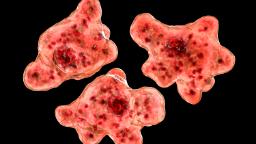
Georgia resident dies of Naegleria fowleri, brain-eating amoeba infection

CNN
—
A Georgia resident who was likely infected while swimming in a freshwater lake or pond has died from a rare brain eating amoeba infection, the Georgia Department of Public Health said.
“A Georgia resident has died from Naegleria fowleri infection, a rare infection which destroys brain tissue, causing brain swelling and usually death,” the health department said in a news release Friday. “The individual was likely infected while swimming in a freshwater lake or pond in Georgia.”
Naegleria fowleri is an amoeba that lives in soil and warm freshwater lakes, rivers, ponds and hot springs. It is not found in salt water, properly treated drinking water or swimming pools, according to the release.
“Prior to this newly confirmed case of Naegleria fowleri infection, there have been five other cases reported in Georgia since 1962,” the release said.
From 1962 to 2021, only four out of 154 people in the United States survived a brain-eating amoeba infection, according to the US Centers for Disease Control and Prevention.
Earlier this month, the Nevada Division of Public and Behavioral Health said a 2-year-old boy died from a brain-eating amoeba infection likely contracted at a natural hot spring. In February, Florida officials said a resident died from the amoeba after a sinus rinse with tap water.
Signs and symptoms of infection are initially severe headaches, fever, nausea and vomiting and they can progress to a stiff neck, seizures, hallucinations, and coma. The infection is treated with a combination of drugs, including the antibiotic azithromycin, the antifungal fluconazole, the antimicrobial drug miltefosine and the corticosteroid dexamethasone.


